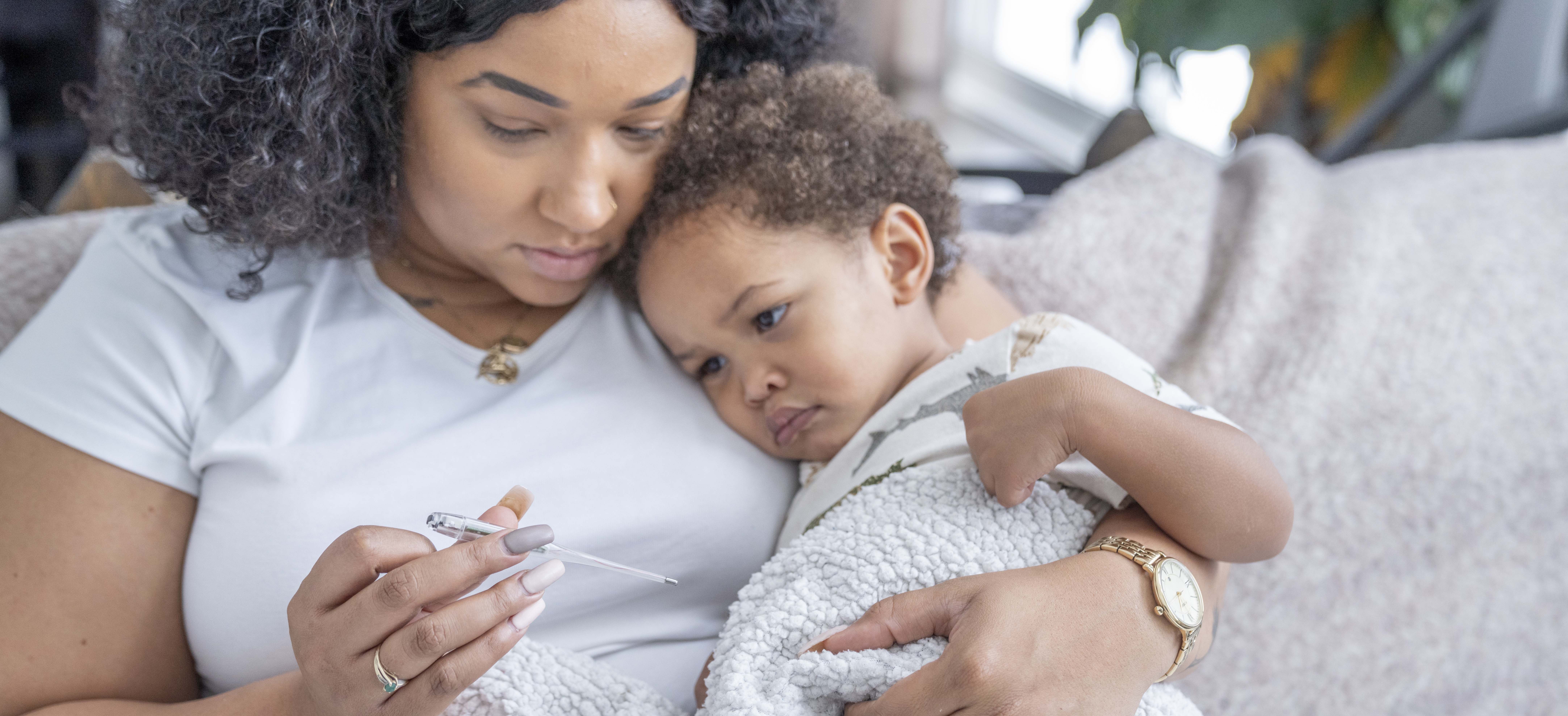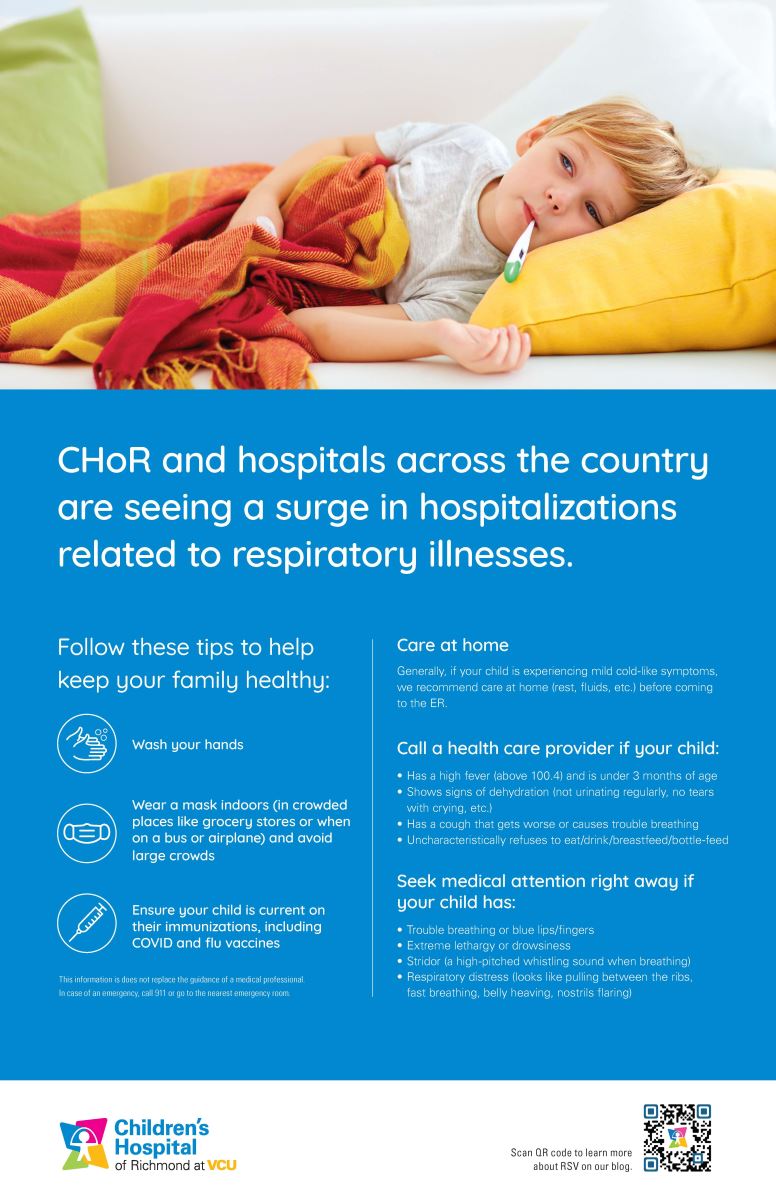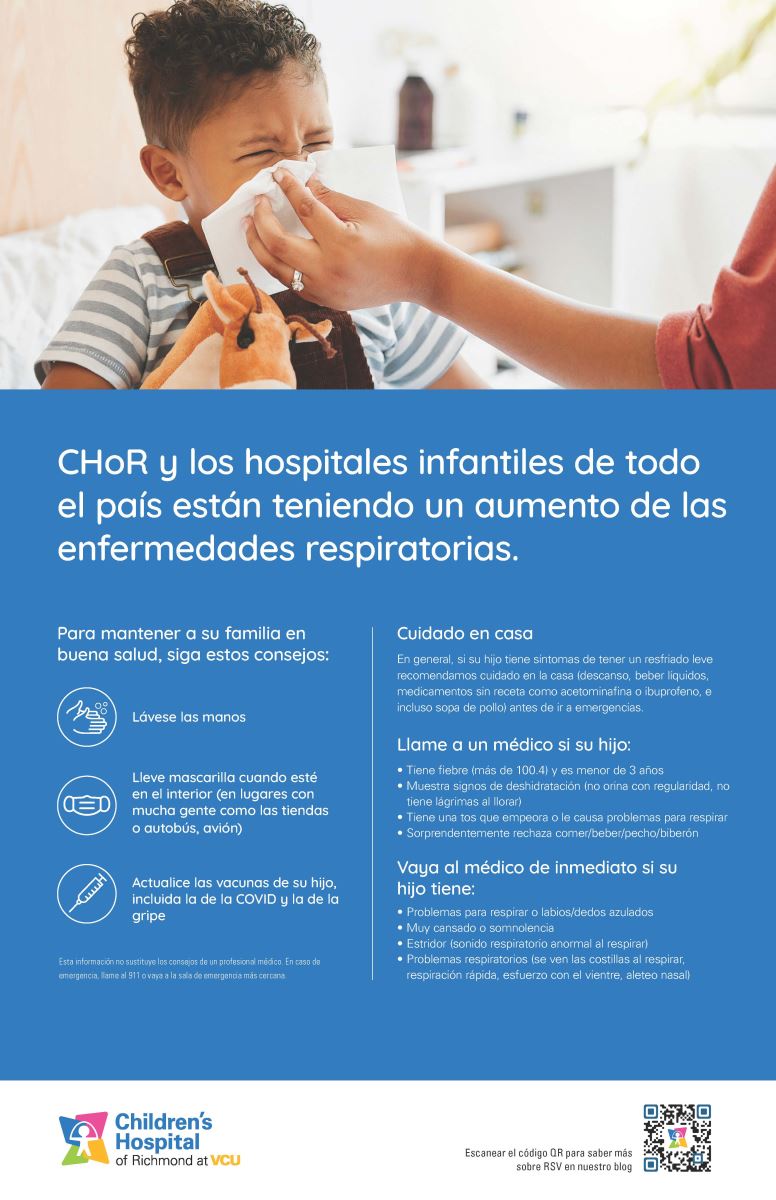
About RSV in children
 Respiratory syncytial virus (RSV) is a common respiratory virus that typically impacts young children in the winter months. Like other children’s hospitals across the country, we’re seeing many RSV cases and the normal peak season is just beginning. Why are we seeing this increase and how can you keep your little ones healthy?
Respiratory syncytial virus (RSV) is a common respiratory virus that typically impacts young children in the winter months. Like other children’s hospitals across the country, we’re seeing many RSV cases and the normal peak season is just beginning. Why are we seeing this increase and how can you keep your little ones healthy?
Dr. Tiffany Kimbrough, pediatrician and mom of two, answers your questions and provides top tips for staying healthy during this RSV season.
What is RSV and who can get it?
RSV is a highly contagious virus that can cause respiratory illness in people of all ages, but is more severe for infants, kids under 5 and children who were born prematurely or with lung or heart conditions.
What is CHoR seeing in terms of RSV?
VCU Health as a whole is seeing a positivity rate of 12 percent, which means that 12 percent of people who have symptoms and are tested for the virus test positive. This is in line with the statewide positivity rate of 11.8 percent reported by the Centers for Disease Control and Prevention.
Most of these cases are among children ages 4 years and younger. RSV, rhinovirus and other respiratory illnesses are creating a surge in hospitalizations in both our pediatric acute care and pediatric intensive care settings. The infections are more severe than we’ve seen in the past, and we’re only at the beginning of what is traditionally considered peak respiratory virus season.
What are the symptoms of RSV?
The symptoms of RSV are like the common cold or flu. They include:
- Congestion or runny nose
- Loss of appetite
- Cough
- Fever
- General malaise (not feeling well)
- Mild headache
- Sore throat
- Wheezing
How is RSV diagnosed and treated?
Because RSV is often mild, diagnostic testing is not always required. If the doctor does test, it will likely be by a nasal swab.
RSV normally lasts a week or two and can often be managed at home, especially in older children. Care is like any other respiratory virus or cold. Children need to get plenty of rest. Over-the-counter medications (acetaminophen or ibuprofen) can be used to reduce fever. Be sure to give your child plenty of fluids too. A humidifier can help relieve some of the symptoms, and a nasal bulb or nose Frida can help suction mucus in infants. It’s a good idea to talk to your child’s pediatrician or primary care provider before giving non-prescription cold medicines, especially to a young child.
When should I be concerned?
Serious cases of RSV can turn into bronchiolitis, an inflammation of the small airways in the lungs, or pneumonia, an infection of the lungs. These can be serious, especially in infants, when not treated.
Call a health care provider if your child:
- Has a high fever (above 100.4) and is under 3 months of age
- Shows signs of dehydration (not urinating regularly, no tears with crying, etc.)
- Has a cough that gets worse or causes trouble breathing
- Uncharacteristically refuses to eat/drink/breastfeed/bottle-feed
Seek medical attention right away if your child has:
- Trouble breathing or blue lips/fingers
- Extreme lethargy or drowsiness
- Stridor (a high-pitched whistling sound when breathing)
- Respiratory distress (looks like pulling between the ribs, fast breathing, belly heaving, nostrils flaring)
Is there a vaccine for RSV?
No vaccine exists for RSV, but an antibody shot called Synagis is available in some circumstances. The shot is only given to infants with compromised immune systems or babies that were born prematurely. Synagis is normally only given during the winter months but pediatricians are authorizing the shot immediately for high-risk babies. Virginia Medicaid has approved coverage of doses due to the recent spike in RSV cases.
What can I do to keep my family healthy?
The COVID-19 pandemic altered the impacts of RSV. During the initial COVID-19 surges, kids were largely staying at home and people of all ages were practicing infection prevention measures like masking, improved hand hygiene and social distancing. These efforts lessened the impact of RSV. In fact, a report in Pediatrics, the Journal of the American Academy of Pediatrics, showed a 98% reduction in RSV cases during the beginning of the pandemic
We need to use many of the same prevention measures as COVID to prevent RSV, including washing hands thoroughly throughout the day. Ensure your children are up to date on childhood immunizations as well as influenza and COVID vaccines. Wearing masks (for children 2 and older) when indoors and avoiding crowds are also helpful.
Keep up with the latest news to help keep your family healthy on our blog

